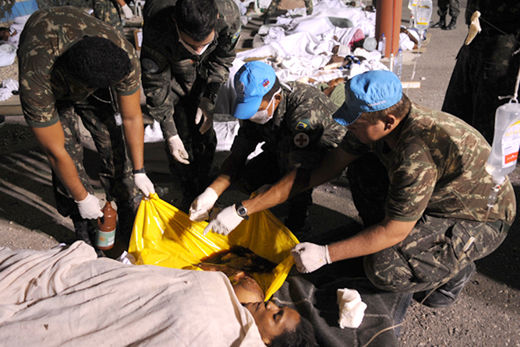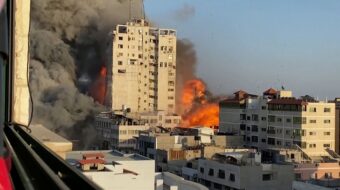
In 1985, Central Mexico, including Mexico City, was hit by an earthquake measuring 8.1 on the Richter scale – much larger than the one that hit Haiti on January 12 of this year. Hundreds of buildings collapsed and thousands were killed.
As in Haiti, buildings were not up to code. Corrupt builders saved money by using substandard materials and construction methods, and corrupt officials let them do it. Many newer apartment and office buildings, as well as hospitals and schools, collapsed while older ones, such as the magnificent 17th century cathedral on the Zocalo (main square) came through without major damage.
Mexico City rebuilt, but there was a political change effectuated by the earthquake. In the center of the city, sweatshops collapsed on top of entire shifts of underpaid, overworked employees. The owners, as soon as they managed to extract their more expensive machinery, abandoned the buildings and the workers, including some, living and dead, who were still trapped in the rubble.
Undaunted, the surviving garment workers, mostly women, did what they could to dig their comrades out, and then formed the nucleus of a variety of new grassroots organizations that not only engaged in self help, but also challenged the power structure in Mexico. Through militant but flexible tactics, they backed the PRI government down so effectively that Mexico City ended up with an elected government rather than the previous appointed one. And in the next presidential elections, in 1988, the left-center candidate almost certainly won and would have taken power away from the PRI had it not been for fraud.
The initiative taken by the seamstresses and others when the government proved unable to deal with the aftermath of an earthquake has borne valuable political fruit. I was reminded of those days when reading John Ross’ amazing new book “El Monstruo: Dread and Redemption in Mexico City.” I remember well a visit of some of the Mexico City seamstresses to Chicago where I lived at the time. There was no sign of pitiful “victimhood”. Listening to them, we all knew that the Mexican working class and nation would move forward, in spite of national disasters and corrupt politicians.
Though the 1985 Mexico City earthquake was a full point stronger on the Richter scale, the damage in Haiti has been vastly greater. The Haitian government has announced that in the capital of Port au Prince alone the death toll is 150,000. Everything is destroyed, but everything is also slowly coming back to life. There has been much outside help, but the Haitian people have been getting together to help themselves also. Everywhere we read about local committees in destroyed neighborhoods and refugee camps making plans for reconstruction and restoration of a nation. This should not surprise us; this has been the story of Haiti from the beginning. A nation acutely conscious of its history of having arisen from a revolution made by slaves is not to be kept down. Haiti will be rebuilt and, with some help, the Haitian people will rebuild it.
But this frightens certain people. Already we here voices on the U.S. right advancing the discredited idea that the Haitian people are poor because they are culturally inferior. Jonah Goldberg, writing in the reactionary National Review, after falsely claiming that Haiti is descending into violence and chaos, says that there is no explanation for Haiti’s poverty except that there is something wrong with Haitian society. “The sad truth about Haiti isn’t simply that it is poor,” Goldberg alleges, “but that it has a poverty culture…Haiti will never get out of grinding poverty until it abandons much of its culture.” David Brooks, writing in the New York Times two days after the earthquake, said much the same thing, except that he blamed much of the problem on “voodoo” and what he alleges are irresponsible child raising practices, which he read about in some book or other.
Since, according to these gentlemen and a host of others, the Haitian people are to blame for their own suffering, they can’t very well be left alone to rebuild their country. They will need an extended period of tutelage under the gentle but firm of wiser, lighter skinned foreigners, such as the U.S. Marines.
The large U.S. military presence in Haiti, and especially the suggestion that it is going to stay there for a long time, is causing alarm in the region. Specifically, Haiti has an election scheduled on February 28, and there is controversy because the electoral commission has ruled that a number of political parties, including the large left-wing Fanmi Lavalas party of exiled former president Jean Bertrand Aristide, can not participate. There are sure to be protests by the large Lavalas base among the poor against this exclusion. The protesters will be portrayed as a dangerous rabble, and if the Marines are still present, there will be strong pressure to use them to suppress the protests. We can not allow that. But the right wing in the United States will specifically want that to happen. They are already saying that the United States must keep Haiti from falling into the hands of ALBA, the Bolivarian Alliance for the People of Our America, a left-wing political and trade bloc led by Cuba, Venezuela, Bolivia and Ecuador which is offering countries in the region a more generous alternative to the trade and development policies pushed by the IMF, the World Bank and U.S.A.
Therefore, now that the main emergency rescue phase is over, we must push for the expeditious removal of the U.S. military and its replacement by UN, NGO and volunteer efforts, always to supplement and never to supplant the efforts of the Haitian people themselves to rebuild. There must be no interference in the February elections and no retribution if the Haitian people choose leaders and policies that Wall Street does not like.
Freedom is a right the Haitian people have earned with their blood.
In 1985, Central Mexico, including Mexico City, was hit by an earthquake measuring 8.1 on the Richter scale – much larger than the one that hit Haiti on January 12 of this year. Hundreds of buildings collapsed and thousands were killed.
As in Haiti, buildings were not up to code. Corrupt builders saved money by using substandard materials and construction methods, and corrupt officials let them do it. Many newer apartment and office buildings, as well as hospitals and schools, collapsed while older ones, such as the magnificent 17th century cathedral on the Zocalo (main square) came through without major damage.
Mexico City rebuilt, but there was a political change effectuated by the earthquake. In the center of the city, sweatshops collapsed on top of entire shifts of underpaid, overworked employees. The owners, as soon as they managed to extract their more expensive machinery, abandoned the buildings and the workers, including some, living and dead, who were still trapped in the rubble.
Undaunted, the surviving garment workers, mostly women, did what they could to dig their comrades out, and then formed the nucleus of a variety of new grassroots organizations that not only engaged in self help, but also challenged the power structure in Mexico. Through militant but flexible tactics, they backed the PRI government down so effectively that Mexico City ended up with an elected government rather than the previous appointed one. And in the next presidential elections, in 1988, the left-center candidate almost certainly won and would have taken power away from the PRI had it not been for fraud.
The initiative taken by the seamstresses and others when the government proved unable to deal with the aftermath of an earthquake has borne valuable political fruit. I was reminded of those days when reading John Ross’ amazing new book “El Monstruo: Dread and Redemption in Mexico City.” I remember well a visit of some of the Mexico City seamstresses to Chicago where I lived at the time. There was no sign of pitiful “victimhood”. Listening to them, we all knew that the Mexican working class and nation would move forward, in spite of national disasters and corrupt politicians.
Though the 1985 Mexico City earthquake was a full point stronger on the Richter scale, the damage in Haiti has been vastly greater. The Haitian government has announced that in the capital of Port au Prince alone the death toll is 150,000. Everything is destroyed, but everything is also slowly coming back to life. There has been much outside help, but the Haitian people have been getting together to help themselves also. Everywhere we read about local committees in destroyed neighborhoods and refugee camps making plans for reconstruction and restoration of a nation. This should not surprise us; this has been the story of Haiti from the beginning. A nation acutely conscious of its history of having arisen from a revolution made by slaves is not to be kept down. Haiti will be rebuilt and, with some help, the Haitian people will rebuild it.
But this frightens certain people. Already we here voices on the U.S. right advancing the discredited idea that the Haitian people are poor because they are culturally inferior. Jonah Goldberg, writing in the reactionary National Review, after falsely claiming that Haiti is descending into violence and chaos, says that there is no explanation for Haiti’s poverty except that there is something wrong with Haitian society. “The sad truth about Haiti isn’t simply that it is poor,” Goldberg alleges, “but that it has a poverty culture…Haiti will never get out of grinding poverty until it abandons much of its culture.” David Brooks, writing in the New York Times two days after the earthquake, said much the same thing, except that he blamed much of the problem on “voodoo” and what he alleges are irresponsible child raising practices, which he read about in some book or other.
Since, according to these gentlemen and a host of others, the Haitian people are to blame for their own suffering, they can’t very well be left alone to rebuild their country. They will need an extended period of tutelage under the gentle but firm of wiser, lighter skinned foreigners, such as the U.S. Marines.
The large U.S. military presence in Haiti, and especially the suggestion that it is going to stay there for a long time, is causing alarm in the region. Specifically, Haiti has an election scheduled on February 28, and there is controversy because the electoral commission has ruled that a number of political parties, including the large left-wing Fanmi Lavalas party of exiled former president Jean Bertrand Aristide, can not participate. There are sure to be protests by the large Lavalas base among the poor against this exclusion. The protesters will be portrayed as a dangerous rabble, and if the Marines are still present, there will be strong pressure to use them to suppress the protests. We can not allow that. But the right wing in the United States will specifically want that to happen. They are already saying that the United States must keep Haiti from falling into the hands of ALBA, the Bolivarian Alliance for the People of Our America, a left-wing political and trade bloc led by Cuba, Venezuela, Bolivia and Ecuador which is offering countries in the region a more generous alternative to the trade and development policies pushed by the IMF, the World Bank and U.S.A.
Therefore, now that the main emergency rescue phase is over, we must push for the expeditious removal of the U.S. military and its replacement by UN, NGO and volunteer efforts, always to supplement and never to supplant the efforts of the Haitian people themselves to rebuild. There must be no interference in the February elections and no retribution if the Haitian people choose leaders and policies that Wall Street does not like.
Freedom is a right the Haitian people have earned with their blood.
Photo: Brazilian soldiers aid Haitian civilian victims of the earthquake. (Roosewelt Pinheiro/Abr, courtesy Wikimedia Commons, cc by 2.5)












Comments